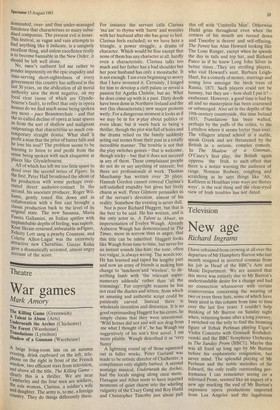Theatre
War games
Mark Amory
The Killing Game (Greenwich) A Talent to Abuse (Arts) Underneath the Arches (Chichester) The Forest (Warehouse) Translations (Lyttelton) Shadow of a Gunman (Warehouse) A beige living-room late on an autumn evening, drink cupboard on the left, telePhone on the right in front of the French Window, two efficient stars from television, and above all the title, The Killing Game — Clearly this is a thriller. We are near Camberley and the four men are soldiers, the sole woman, Clarissa, a soldier's wife and daughter. The army is, to me, a foreign country. They do things differently there. For instance the servant calls Clarissa 'ma'am' to rhyme with 'harm' and wrestles with her husband after she has gone to bed. Clarissa feels excluded; so we have here a triangle, a power struggle, a drama of character. Which would be fine except that none of them has any character at all, hardly even a characteristic. Clarissa talks too much and her father has a bad shoulder but her poor husband has only a moustache. It is not enough. I am even beginning to worry that I have invented it. Certainly, I longed for him to develop a cleft palate or reveal a passion for Agatha Christie, but no. What he does come up with is a past. Dirty deeds have been done in Northern Ireland and the wet (his characteristic) new major protests wetly. For a dangerous moment it looks as if we may be in for aplay about politics or even ideas; but it veers back to being a thriller, though the plot was full of holes and the drama relied on the family suddenly acting out scenes from their past in a totally incredible manner. The trouble is not that the play switches genres — that is welcome, though tricky — but that it does not succeed in any of them. These complaisant people do not do or say anything of interest; but there are professionals at work. Thomas Muschamp has written over 20 plays. Hannah Gordon cannot conceal Clarissa's self-satisfied stupidity but gives her lively charm as well. Peter Gilmore persuades us of the servant's devotion, almost of his reality. Somehow the evening is never dull.
Nor is poor Richard Huggett, but that is the best to be said. He has written, and is the only actor in, A Talent to Abuse, an impersonation of Evelyn Waugh. Already Auberon Waugh has demonstrated in The Times, more in sorrow than in anger, that this title can be inherited. Huggett looks like Waugh from time to time, but never for an instant sounds like him; the tone, often too vulgar, is always wrong. The words too. He has learned and taped his lengthy part and now an army of friends is making him change to luncheon'and 'wireless', to describing lamb with 'the relevant supernumerary addenda' rather than 'all the trimmings'. For copyright reasons he has not read the diaries and letters, from which an amusing and authentic script could be painlessly carved. Instead there is wholesale invention and distortion. It is no good reprimanding Huggett for his errors, he simply claims that they were intentional. 'Wild horses did not and will not drag from me what I thought of it', he has Waugh say suggestively of his son's first novel. I am more pliable. Waugh described it as 'very funny'. A lightning round up of those squeezed out in fuller weeks. Peter Garland was made to be artistic director of Chichester, a compliment only slightly barbed. A second nostalgic musical, Underneath the Arches, had the locals singing along once more. Flanagan and Allen seem to have injected moments of quiet charm into the whirling vulgarity of the Crazy Gang and Roy Hudd and Christopher Timothy just about pull this off with 'Umbrella Man'. Otherwise Hudd grins throughout even when the corners of his mouth are turned down and Timothy is decent and self-effacing. The Forest has Alan Howard looking like The Lone Ranger, except when he spends the day in tails and top hat, and Richard Pasco as if he knew Long John Silver in better times— They are strolling players, who visit Howard's aunt, Barbara LeighHunt, for a comedy of money, marriage and young love amongst the birch trees of Russia, 1871. Such players could not be hammy, but they are — how shall I put it? — exuberant. However, a good time is had by all and no masterpiece has been coarsened or submerged. Also set in the depths of the 19th-century countryside, this time Ireland 1833, Translations has been wafted, perhaps by the puffs of the critics, to the Lyttelton where it seems better than ever. The villagers attend school in a stable, speak Greek and are threatened by the British in a serious, complex comedy. In The Shadow of a Gunman, O'Casey's first play, the British again oppress the Irish, to such effect that there is a notice warning the audience of range. Norman Rodway, coughing and scratching as he says things like `Ah, Kathleen ni Houlihan your ways are thorny ways', is the real thing and the clear-eyed view of Irish troubles has not dated.


































 Previous page
Previous page